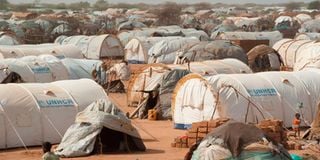One year after camp closure decree, what next for Dadaab refugees?

Dagahaley refugee camp, part of the Dadaab Refugee Complex, as seen in 2011, amid a spike in daily refugee arrivals in the already drastically overpopulated camp.
What you need to know:
- Many refugees in Dagahaley say they are seeing an increase in new arrivals in the camp.
- Refugees in Dadaab are showing immense solidarity with those newly arrived.
It has been over a year since Kenya announced it will close its refugee camps by the end of June this year. But with little to offer in terms of durable solutions to refugees, closing the camps now looks increasingly impossible. Recently, we have seen discussions evolve from closing the camps to adapting them into integrated settlements.
While this is welcome, a year later, durable solutions are still not within reach for the more than 200,000 refugees in Dadaab. The new Refugee Act provides a strong foundation to facilitate integration of refugees but much work remains in identifying concrete pathways for them to become self-reliant.
Meanwhile, the lingering uncertainty over the future of the camps and the continued delay in finding durable solutions for refugees has led to a decline in life-saving assistance for refugees as many humanitarian organisations struggle to secure funding and plan for activities. This is happening with Kenya and its neighbours, including Somalia, reeling under severe drought.
Many refugees in Dagahaley say they are seeing an increase in new arrivals in the camp, one of three that make up the Dadaab Refugee Complex. The UNHCR stopped registering new arrivals in 2016, so many of those who have come since have little no access to basic services.
Refugees in Dadaab are showing immense solidarity with those newly arrived. But the economic scars of the Covid-19 pandemic, diminished humanitarian assistance and the burden of sharing the little they have with the new arrivals means their coping capacities have been stretched thin.
The 30-year-old Dadaab camp is now home to three generations of refugees: A generation that fled to Kenya, another raised in the camps and one born and raised there who have never known any other home. Half the Dadaab population are under 25. Many feel a loss of identity besides their other challenges—including not being allowed to work, access higher education and free movement.
Prolonged displacement
The mental health impact of prolonged displacement has been further magnified following the pandemic. The camp closure announcement brought further uncertainty, heightening mental health concerns. As a result, substance abuse among the youth in the camps has increased with cases of attempted suicide among the refugees.
There is an increasing sense of despair, low self-esteem and apathy among the youth. Many young refugees lost out on education opportunities during the pandemic. Some had to forgo scholarships and many have since dropped out of school altogether.
Urgent efforts and investment by both Kenya and the international community is needed to realise durable solutions for the predicament of refugees. This must be done through meaningful consultations with refugees and their host communities.
To hasten the process, the government should urgently announce that the camps will not be closed. It should then work with the UNHCR to provide a clear road map so that refugees and humanitarian agencies can plan the transition in a way that ensures every refugee will continue to access essential services until all become self-reliant.
Kenya should also urge the UNHCR to start registering new arrivals as well as those without documentation so that they can access humanitarian assistance. Many of the new arrivals say they have no food and are forced to sleep outside in the harsh environment. Some of the refugees hosting the new arrivals are themselves undocumented, making their situation even more precarious.
Donors need to step up support to refugees by increasing funding available for them. This is vital now more than ever to address their immediate needs, as well as support their transition from camps.
After three decades of displacement, refugees in Dadaab are close to leading a life with dignity. We cannot abandon them now. It is time to redouble our efforts to secure durable solutions for refugees.
Mr Matthys is the project coordinator for Médecins Sans Frontières/Doctors Without Borders (MSF) in Dadaab. [email protected]





